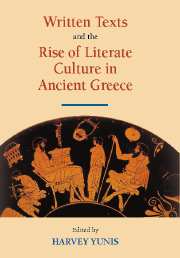Book contents
- Frontmatter
- Contents
- Preface
- Contributors
- Introduction: Why Written Texts?
- 1 From Letters to Literature: Reading the “Song Culture” of Classical Greece
- 2 Writing Religion: Inscribed Texts, Ritual Authority, and the Religious Discourse of the Polis
- 3 Letters of the Law: Written Texts in Archaic Greek Law
- 4 Writing, Law, and Legal Practice in the Athenian Courts
- 5 Literacy and the Charlatan in Ancient Greek Medicine
- 6 Literacy in Greek and Chinese Science: Some Comparative Issues
- 7 Writing Philosophy: Prose and Poetry from Thales to Plato
- 8 Prose Performance Texts: Epideixis and Written Publication in the Late Fifth and Early Fourth Centuries
- 9 Writing for Reading: Thucydides, Plato, and the Emergence of the Critical Reader
- 10 Reflecting on Writing and Culture: Theocritus and the Style of Cultural Change
- Bibliography
- Index
Introduction: Why Written Texts?
Published online by Cambridge University Press: 30 July 2009
- Frontmatter
- Contents
- Preface
- Contributors
- Introduction: Why Written Texts?
- 1 From Letters to Literature: Reading the “Song Culture” of Classical Greece
- 2 Writing Religion: Inscribed Texts, Ritual Authority, and the Religious Discourse of the Polis
- 3 Letters of the Law: Written Texts in Archaic Greek Law
- 4 Writing, Law, and Legal Practice in the Athenian Courts
- 5 Literacy and the Charlatan in Ancient Greek Medicine
- 6 Literacy in Greek and Chinese Science: Some Comparative Issues
- 7 Writing Philosophy: Prose and Poetry from Thales to Plato
- 8 Prose Performance Texts: Epideixis and Written Publication in the Late Fifth and Early Fourth Centuries
- 9 Writing for Reading: Thucydides, Plato, and the Emergence of the Critical Reader
- 10 Reflecting on Writing and Culture: Theocritus and the Style of Cultural Change
- Bibliography
- Index
Summary
While the Homeric poems continued to be the dominant works of literature, it would scarcely be an exaggeration to say that during the four generations which extended from the mid-fifth century to the death of Aristotle in 322 the minds of men were to a considerable extent remade by contemporary books.
This book considers a number of intellectual and social practices of ancient Greece: religion, law, medicine, science, philosophy, and several kinds of literature. In each case, we ask how the practice in question was affected by the introduction and use of written texts. Now, the relation between human activities and the tools employed in those activities is generally worth reflecting on, as the startling pace of modern technology cannot but remind us. Yet the case of written texts is compelling for reasons of its own. While the practices under consideration may not require writing for them simply to be carried out, they do require language as a vehicle for communicating intentions and meanings. So much is clear from Greece and elsewhere. Yet it is a fundamental fact of human history that, as a way of recording and transmitting language, writing established itself, over time and much of the world, as an indispensable feature of the practices under consideration. The current set of essays inquires into the conditions and consequences of the establishment of written texts within these cultural practices in ancient Greece.
- Type
- Chapter
- Information
- Publisher: Cambridge University PressPrint publication year: 2003

